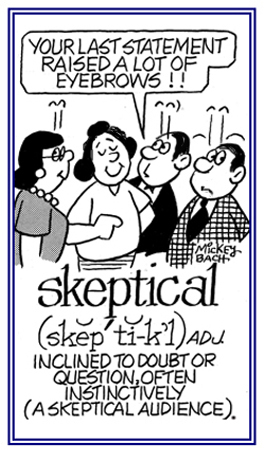scopo-, scop-, scept-, skept-, -scope-, -scopy, -scopia, -scopic, -scopist
(Greek > Latin: see, view, sight, look, look at, examine, behold, consider)
scopograph
An x-ray unit which has capabilities for both fluoroscopy (an instrument for visual observation of the body by means of x-rays) and radiography.
scopolagnia
The pleasure gained by a voyeur from voyeurism which involves the secret viewing of another person in a place where that person would have a reasonable expectation of privacy, for the purposes of the viewer's sexual arousal.
scopophilia, scoptophilia
Obtaining sexual pleasure by looking at nude bodies, erotic photographs, etc.
scopophiliac, scoptophiliac
1. Someone who derives sexual pleasure from watching or looking at an unsuspecting person who is nude, in the act of disrobing, or engaging in sexual intercourse.
2. An individual affected with scopophilia.
2. An individual affected with scopophilia.
An anxiety disorder characterized by a morbid dread of being seen or stared at by others: Scopophobia can arise from a traumatic occurrence in childhood, or when mocked or taunted as a child, or perhaps it is due to a physical disability, causing that person to avoid being in public gatherings.
The condition is commonly seen in people who are suffering with schizophrenia.
A person very troubled with being seen or being stared at: Janet, having the indications of being a scopophobiac, was a beautiful girl, very quiet and reserved, but she didn't want to be looked at or noticed, so she dressed in dark clothes, didn't wear any makeup, and let her hair hang straight down, hoping that nobody would notice her.
scotoscope
A type of telescope that uses image intensifiers to improve night viewing.
scotoscopy
The study of the retina of the eye by means of the ophthalmoscope.
seismoscope, seismoscopic
A simple form of seismometer; a contrivance for detecting or indicating the occurrence of an earthquake shock, sometimes also indicating (without measuring) the intensity or direction of the earthquake waves.
sideroscope
A magnet or other appliance for determining the presence of metallic iron as a foreign body in the eye.
sigmoidoscope
A fiber-optic tubular instrument inserted through the anus for examining the interior of the rectum and sigmoid (lower) colon.
sigmoidoscopy
Inspection of the sigmoid colon through a sigmoidoscope.
sinus endoscopy
In sinus endoscopy, an endoscope is inserted into the nose, and the interior of the nasal passages, the sinuses, and the throat are examined.
This procedure can be done in a physician's office. The endoscope is inserted into a nostril and is threaded through the sinus passages to the throat.
To make viewing of these areas easier, and to record the areas being examined, a camera, monitor, or other similar viewing device is connected to the endoscope.
skeptic, sceptic
1. Someone who habitually doubts accepted beliefs.
2. A person who questions the validity or authenticity of something purporting to be factual.
2. Any one who maintains a doubting attitude, as toward values, plans, statements, or the character of others.
3. Someone who doubts the truth of a religion; especially, Christianity, or of important elements of it.
4. When capitalized, a member of a philosophical school of ancient Greece, the earliest group of which consisted of Pyrrho and his followers, who maintained that real knowledge of things is impossible.
5. Any later thinker who doubts or questions the possibility of real knowledge of any kind.
6. Etymology: from 1587, "member of an ancient Greek school that doubted the possibility of real knowledge"; from French sceptique, from Latin scepticus, and previously from Greek skeptikos; literally, "inquiring, reflective", the name taken by the disciples of the Greek philosopher Pyrrho (c.360-c.270 B.C.E.), from skeptesthai, "to reflect, to look, to view".
2. A person who questions the validity or authenticity of something purporting to be factual.
2. Any one who maintains a doubting attitude, as toward values, plans, statements, or the character of others.
3. Someone who doubts the truth of a religion; especially, Christianity, or of important elements of it.
4. When capitalized, a member of a philosophical school of ancient Greece, the earliest group of which consisted of Pyrrho and his followers, who maintained that real knowledge of things is impossible.
5. Any later thinker who doubts or questions the possibility of real knowledge of any kind.
6. Etymology: from 1587, "member of an ancient Greek school that doubted the possibility of real knowledge"; from French sceptique, from Latin scepticus, and previously from Greek skeptikos; literally, "inquiring, reflective", the name taken by the disciples of the Greek philosopher Pyrrho (c.360-c.270 B.C.E.), from skeptesthai, "to reflect, to look, to view".
skeptical (adjective), more skeptical, most skeptical
1. A reference to a person who is not easily convinced, has doubts, or reservations: Many of the skeptical citizens of Tom's town found it difficult to believe that the mayor would not increase local taxes in order to pay for the new government building.

© ALL rights are reserved.
Go to this Word A Day Revisited Index
Kate's skeptical supervisor didn't think she could finish her project on time.
2. Etymology: from Greek skeptesthai, "to examine, to consider, to view, to reflect".
Go to this Word A Day Revisited Index
so you can see more of Mickey Bach's cartoons.
Cross references of word families that are related directly, or indirectly, to: "appear, visible, visual, manifest, show, see, reveal, look": blep-; delo-; demonstra-; opt-; -orama; pare-; phanero-; phant-; pheno-; spec-; vela-, veal-; video-, visuo-.


